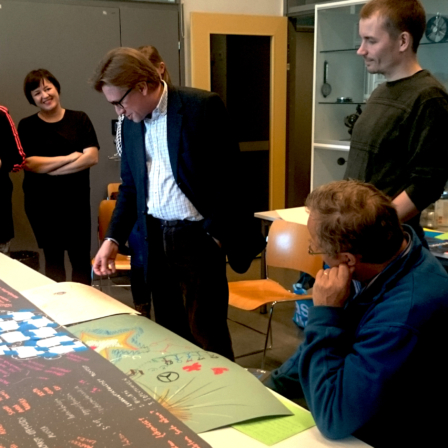The inspiring and encouraging motto of the Olympic movement is Citius, altius, fortius – faster, higher, bolder.* These words are appropriate in many situations where people are striving for better performance or want to create something new.
They are also perfect to describe the challenge of climate change. We have to act faster, aim higher and, above all, be bolder. Emissions reduction is something that just can’t wait. It’s not enough to fiddle around with small improvements. We have to think big, step out of our comfort zone and take bold steps. We need to compete in the Olympic spirit in order to produce the best possible performance.
Until now, courage has been a scarce resource in conjunction with climate change. I believe that providing correct information and a deeper understanding of the phenomenon will increase the motivation and daring needed to start working on behalf of the climate. This was also the starting point when we began developing new teaching material on climate change, under Sitra’s leadership.
Based on the Climate.now materials produced through multidisciplinary co-operation, the first course started on 2 November at the University of Helsinki’s Open University. The course was open to everyone with an interest in the scientific background of climate change, its impacts and adaptation to it, as well as the methods of mitigation. In other words, the course covers the basics of a phenomenon that will play a key role in determining our future over the next 50 to 100 years.
During the Climate.now project, nearly everything has gone against tradition: the material was produced via co-operation between several universities, including a university of applied sciences; the team was made up of climate researchers, engineers and artists; and Sitra was actively involved in producing the course material. The end result is online material that is open to everyone, with the videos available on YouTube.
The process of creating the material was something that already required courage and an open-minded approach. Since climate change affects all parts of society, it should also be approached in a broad-based and multidisciplinary manner. The outcome of this co-operation encourages a move away from the subject-specific thinking that characterises the university world. The course material and concept are also unprecedented on an international level.
I was involved in the first and last phases of the project. For me, the most exciting parts of the process were the genuine multidisciplinary approach and, in particular, the role of art. The Climate.now project is a fine example of how to combine a multidisciplinary approach with creative methods.
The Climate.now course material means that the next move is up to the university world and society in general. It encourages co-operation and interaction between different subjects. The package provides course material and a template that makes it easy to offer a multidisciplinary course. Now, universities need to find the courage to adopt a new course-planning style that, rather than focusing on a specific subject, starts with a common problem that concerns all fields. We need interaction between the people working in different areas. Could art and science be combined in the same course? How about bringing engineers and artists together to work on the problem of climate change?
I ask each of you to consider what your field could do to meet the challenge of climate change. This work is only just beginning. In the words of Tommy Tabermann: how much courage do we dare to not use today?
The first pilot course based on the Climate.now material started at the University of Helsinki’s Open University on 2 November 2016. Read more here.
* Fortius is translated as stronger or bolder. Stronger is generally used in the motto of the Olympic movement – but in this context I have chosen to use bolder.





















Recommended